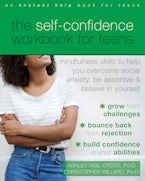By Christopher Willard, PsyD, coauthor of The Self-Confidence Workbook for Teens
Mindfulness with teens sounds amazing—but how do we get past the eye rolling? Over the years I’ve thought a lot about this, with a few successes and many failures. But I’ll share these five “Rs” as tips to get things started.
Relevance: A lot of well-intentioned adults start by thinking teens need mindfulness for mental health or for stress. But for many, mental health stigma or simply other priorities get in their way. Like trying to teach kids anything, we need to make it relevant to their lives. Here are a few more “Rs” to keep things relevant.
Recreation – Can mindfulness help them with recreational activities they love? Boost creativity in their passion for the arts? Cultivate confidence for the performance? Keep their head in the game during the penalty shots or free throws in the playoff game? Can listening to music more mindfully help them enjoy their favorite song a bit more, or appreciate time off?
Role Models – Did you know Leo Messi got so bored in the pandemic he started practicing meditation? How about Simone Biles using mindfulness to manage her stress? LeBron James leads meditations you can find online, and winning teams like the Golden State Warriors do mindful “mental fitness” training? Beastie Boys or Wu-Tang Clan may be more my generation, but did you know Earl Sweatshirt, J. Cole, and Drake have all mentioned mindfulness and meditation?
Relationships – Teens can smell bullshit from a mile away, often as a matter of survival, so a trusting and authentic relationship with a facilitator and the rest of the group are key to getting them comfortable and open to practice.
Secondly, teens care a lot about their relationships with each other. Okay, what we adults think of them may not be their priority, but they care a lot about peers, and that’s evolutionarily and developmentally appropriate. That’s not to say mindfulness will make anyone instantly popular, but everyone does like to be around people who are fully present. What’s more, they can share skills to help struggling friends. I might say to a skeptical kid, “Okay, maybe you don’t need mindfulness, but this 7/11 breathing can be psychological first aid to help a friend struggling with anxiety, disappointment, or other strong emotions—and that can help you be a better friend.”
Roll with It – Yeah, you can bring mindfulness to anything, right? With the right kids, sometimes we can get playful with their sarcasm and resistance. How does it feel to mindfully roll your eyes? Or giggle? How do you even know you are bored, what happens in your body or your mind? This approach doesn’t always work, but sometimes you can get some mileage. And also, remember that just because they roll their eyes now, doesn’t mean that they aren’t listening; often they might have to act too cool, but then they give it a shot later.
There’s no one-size-fits-all, and I’m sure you can think of dozens more buy-in ideas for teens, but hopefully this list gives you a start. And please share any other ideas you might have in the comments below; a lot of adults and future adults will thank you.
Christopher Willard, PsyD, is a psychologist and educational consultant based in Boston, MA; who specializes in mindfulness. He has been practicing meditation for twenty years, and leads mindfulness and mental health workshops internationally. He currently serves on the board of directors at the Institute for Meditation and Psychotherapy, and is president of the Mindfulness in Education Network. He has presented at TEDx conferences, and has been quoted in The New York Times, The Washington Post, www.mindful.org, and elsewhere. He is author of Child’s Mind, Growing Up Mindful, Raising Resilience, and three other books. He teaches at Harvard Medical School.



 Part 2: What to Do When a Client Is Participating in Self-Judgment?
Part 2: What to Do When a Client Is Participating in Self-Judgment?